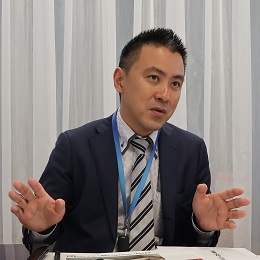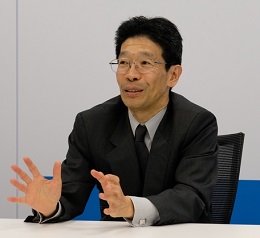
Toward an Era of Active Participation by Disabled People in Convenience Stores
The entire service industry, including the convenience store industry, has recently been faced with serious labor shortages. NRI Retail Next is focused on people with disabilities as an untapped workforce, and is cooperating with NRI Mirai, a special subsidiary of the NRI group, to pursue joint research pertaining to the employment of disabled people in the service industry. As part of that research, a test project involving satellite stands on the various floors of NRI's Yokohama Nomura Building is being carried out, and people with disabilities are engaged in operating them. We are broadening the sphere in which the disabled can participate by ensuring that they can execute their duties without obstacles by means of a work support app and by promoting the development of work environments that are more amenable to disabled workers.
Convenience Stores and the Concern about Labor Shortages
Convenience stores are an indispensable part of our lives. These irreplaceable stores now support the life of the community not only because one can buy onigiri rice balls, prepackaged lunches, and daily necessities at any time, but also because they provide products and services that accommodate the changes that are occurring in our lifestyles, such as the increase in dual-income households and elderly people who live on their own. However, because of the shrinking population, declining birthrates, and societal ageing, convenience stores are faced with the serious problem of labor shortages. As the owners who manage individual stores get older and the ratio of available jobs to workers multiplies, we have situations where students and part-time workers are not easy to attract for these jobs.
Given these issues, the various major convenience store chains have implemented a variety of measures with the goal of reducing the labor required for store operations. FamilyMart has begun to reexamine its policy of being open 24 hours. Lawson, at some of its stores, is using IT to automate tills and is trying out unmanned tills at night. 7-Eleven has begun upgrading its stores with the intention of "improving the ease of working there" and attempting to reduce the workload at each store.
Convenience Store Satellite Stands to Employ People with Disabilities
NRI has a long history of assisting 7-Eleven with their operations, having developed and operated the company's enterprise systems since 1979. In 2016, we established NRI Retail Next, Ltd. and pushed forward with research and development on store formats that could address the environmental changes that the convenience store industry has been caught up in. At present, the company is addressing the labor shortage by incorporating AI and other advanced technologies as it advances research on store formats that are accommodating for people with disabilities ? a promising untapped workforce.
NRI Retail Next has pushed forward with a feasibility study involving snack stands (hereinafter, "satellite stands") inside offices at NRI's Yokohama Nomura Building. In the 14th-floor stair lounge (a space connected to the inner stairs for employees to take breaks and socialize), a dozen or so snack and drink options are available, and the office space on each floor also has a small pantry where several snacks and drinks are sold. These stands are operated with the help of people with disabilities who are employees of NRI Mirai, Ltd., a special subsidiary of the NRI group. Twice a week, a team of two people visits the stands to replenish the merchandise, clean the stand, arrange the display (positioning the product packages so they face the front), and perform other duties.
Replenishing Snacks and Drinks Twice a Week
This satellite stand test project began in August 2017. Daiki Ihara, head of the Business Planning Department at NRI Retail Next, which launched this project, says that the motivation to use disabled people came from seeing how diligently NRI Mirai employees performed their work of carrying interoffice mail.

Planning Dept., NRI Retail Next, Ltd.
"The rapid growth of the convenience store industry has benefited from the support of IT systems. However, managing stores and utilizing personnel are something that is yet to come for IT investment. AI is undergoing rapid development these days and has expanded into the convenience store industry. By using IT and AI, we've been able to expand the field in which disabled people, a potential workforce, can operate to include convenience stores, and we think they could even play a role in eliminating the labor shortage."
At present, the rough workflow is as follows. NRI Mirai employees place a product basket containing snacks and drinks onto a cart, and then they move it from the warehouse to the satellite stand. When they arrive at the stand, they take out the products and arrange them in accordance with their instructions. While they are arranging them, they position the snacks and drinks to face the correct way. They also keep the stand in good order, performing thorough checks to see if the POP is out of place, to ensure that the product cart has not deviated from its position, and so on. In order for NRI Mirai employees to carry out this continuous series of tasks independently and without assistance from their supervisors, we proceeded to implement a test project to develop a prototype work support system. Going forward, we would like to promote this initiative by expanding the test field to include stores operated by our company.
Detailed Procedures and an iPad Work App

NRI Mirai, Ltd.
NRI Mirai is a company that continues to pursue practical efforts aimed at independence for people with disabilities. This is a company whose mission statement is "to maximize the potential of people with disabilities so that they can perform jobs that create value for society," and our involvement with these satellite stands is a major opportunity to "achieve results for the purpose of expanding career options for people with disabilities." That said, taking advantage of this opportunity has required hard work.
As NRI Mirai president Koji Adachi puts it, "We have challenged to have our employees perform their work procedures in a way that is meticulous and precise, in order to ensure the quality of their work." For example, instead of being instructed to do a task "properly," employees are given more specific instructions to " wipe five times." Furthermore, different employees are given different instructions on how to perform the same tasks after observing their respective characteristics. A non-disabled person catches on quickly after reading the instructions, but for a person with an intellectual handicap or a mental disorder to understand, the job must be broken down into a more detailed procedure.
At NRI Mirai and NRI Retail Next, we have been designing an easy-to-understand interface that provides detailed procedures for disabled people through joint workshops. We introduced it as an iPad work app starting in February 2018. The screens and usability are extremely simple, so that it can be used without difficulty by anyone, including not only disabled people, but also foreigners, elderly employees, and others for whom it is their first time working a retail job.
Toward a Society in Which Disabled People Contribute to the Community
Adachi says that NRI Mirai employees "really look forward to the job of lining up the products in the satellite stands. They are happy to handle products that are familiar to them, and following each procedure in order to achieve their own objectives gives them confidence in themselves."
As the population shrinks and the ageing of society progresses, convenience stores will be expected to play even a larger role than they already do. Adachi observes that "There will naturally come a time when a wide range of locations are opened up to disabled people, who are an untapped workforce, and that disabled people will be the ones supporting other disabled people and contributing to the local community."
Disabled people, the elderly, and other people previously not regarded as workers will get involved in supporting society, with the use of IT also having a role. NRI Retail Next is taking that step with its efforts to create environments at convenience stores where disabled people can thrive and be involved.
If you would like more detailed information, please check out the following sources.
Sustainability Topics:
Video:
"Nomura Research Institute New Office (NRI New Office)"
(YouTube)